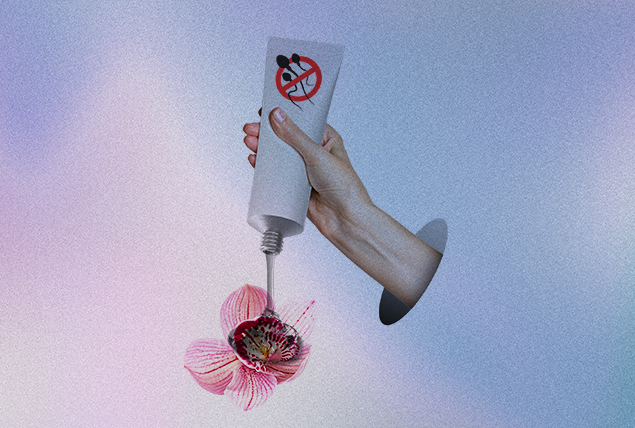What Are Spermicides and Do They Work?

Having sex can be a fun and intimate experience between consenting partners. If you want to avoid unwanted pregnancies, though, you should encourage the use of condoms and birth control to protect yourself and others.
One lesser-known prevention method to consider when having sex is spermicide. But does it work as well as other options? Let's find out from the experts.
What is spermicide?
Spermicide is a chemical applied on or near the cervix before sex, according to Planned Parenthood. As a contraceptive, spermicide blocks the cervix's entrance to prevent sperm from reaching an egg and also affects sperm's ability to swim into the fallopian tubes.
There are different types of spermicides available on the market, such as:
- Creams
- Film
- Foams
- Gels
- Sponges
- Suppositories (a soft insert that melts into a cream-like substance in the vagina)
While you can use spermicide on its own, it's recommended you combine it with other forms of contraception to increase protection against unwanted pregnancies and sexually transmitted infections (STIs). Spermicide on its own isn't as effective without using other contraceptives.
"When used on its own, [spermicide] isn't too effective, with about 20 percent of people using it falling pregnant within the first year of use," said Rhiannon John, who obtained her master's degree in sexology from Curtin University in Perth, Australia, and is now in New York City working as a sexologist for Bedbible, a sex toy reviewer.
John suggested using spermicide in combination with condoms or diaphragms.
What are the pros and cons of using spermicides?
Like any other form of birth control, spermicides have benefits and downsides. Understanding these factors is vital to making an informed decision about safer sex.
The pros of spermicides
Spermicides are easy to use. Some contraceptives require many steps that can be confusing to follow, making them less effective and occasionally ruining the mood in the bedroom.
Here's what you have to do with spermicide:
- Wash your hands before applying spermicide.
- Insert the spermicide as deep into the vagina near or on the cervix. This should be done at least 10 to 15 minutes before having sex.
- After sex, do not wash or remove the spermicide.
- Do not place anything into the vagina for at least six hours to ensure the spermicide can be as effective as possible.
If you need extra lubrication during sex, certain spermicides, such as gels and jellies, can substitute as lubricants and help reduce friction and vaginal tearing.
"While you might not think of spermicide as a tool to increase pleasure, spermicide lubricants are available, and we all know that lube makes everything a lot more fun when it comes to sex," John said.
Spermicides are also safe to use with erectile dysfunction (ED) medications.
"Spermicide is safe to use with ED medications like Viagra [sildenafil] and Cialis [tadalafil]," said Victor Sun, M.D., a medical consultant at SuperPill, a digital health clinic in Burbank, California.
Using spermicides can possibly improve erectile function, too. A 2021 study published in the journal Bioactive Materials suggested spermicide gels can increase erectile function during sexual intercourse.
The cons of spermicides
Spermicides on their own aren't as effective compared with other contraceptive methods.
Vaginal spermicides are 82 percent effective when used independently (and with perfect use). Contrast this with contraceptives such as implants and intrauterine devices (IUD) resulting in less than 1 pregnancy per 100 women in a year.
Spermicides also don't protect against STIs.
"Spermicide does not protect against sexually transmitted diseases, as it only acts on sperm function," Sun said.
In addition, Sun noted using a spermicide could cause genital irritation, which can increase the risk of contracting STIs and HIV.
John recommended spermicide be paired with another contraceptive, such as condoms, to prevent STIs, with the caveat that not all spermicides work well with latex condoms. Some spermicide products are oil-based, which may damage certain contraceptives, such as condoms. Sun said oil-based spermicides should be avoided because they can wear out the latex and cause breakage.
Alternatives to spermicides
When appropriately used, spermicides can provide peace of mind and protection against unintended pregnancy. However, there are some drawbacks to using spermicides, including potential irritation and discomfort.
Here are some familiar alternatives to spermicides that you may want to consider:
Condoms
Condoms come in two types: male and female (internal condoms). Male condoms are effective 98 percent of the time when used perfectly every time, but realistically, they're about 87 percent effective with typical use. Female condoms can be 95 percent effective if used correctly, but they're more mistake-prone, so their actual effectiveness is about 79 percent.
Diaphragms
Diaphragms are reusable, unlike condoms. They're only available with a prescription and are not as effective as condoms. Even when used with a spermicide, diaphragms are about 86 percent effective with perfect use, 82 percent with typical use. Also, you must wear the diaphragm for at least six hours after having sex for it to be as effective as possible.
Cervical caps
Cervical caps are inserted into the vagina, forming a barrier between sperm and the cervix. Similar to diaphragms, cervical caps are about 88 percent effective when combined with spermicide.
Birth control pills
The most common type of birth control method, outside of condoms, is the birth control pill. Forgetting a dose can increase your risk of pregnancy. Even if you take birth control pills 100 percent of the time, there's still a small chance of pregnancy, with 99 percent effectiveness with perfect use. Allowing for mistakes, it's 93 percent effective.
Intrauterine devices (IUDs)
Intrauterine devices (IUDs) are T-shaped devices inserted into a woman's uterus. These contraceptive devices are more than 99 percent effective. Made from copper or plastic, they can last between three and 12 years.
Spermicides make excellent additions to other methods of contraception but they are not as effective on their own. It's recommended you use spermicides in combination with barrier contraception, like condoms or diaphragms, for STI prevention.
Speak to your healthcare provider to find out whether spermicides are right for you.


















